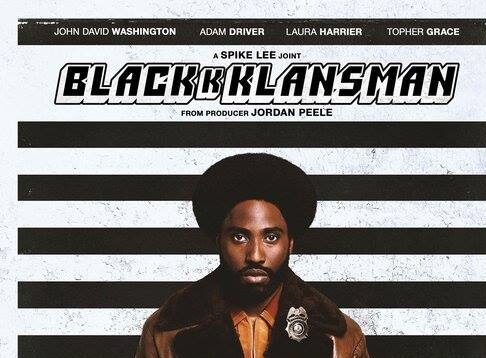The knot in my stomach churned up by BlacKkKlansman still gnawed at my insides more than an hour after the credits stopped scrolling. The knot emerged while watching Spike Lee’s brilliant opening scenes in his most recent contribution to our nation’s discussion on race in America.
While I don’t think it rises to be one of best movies of 2018, for artistic reasons I discuss below, Lee’s Oscar nomination for Best Director is well deserved. The movie is well worth watching although viewers should be prepared: the substance will not be easy to digest (nor is it intended to be).
The History
Blackkklansman is inspired by a true story: an African-American police officer who infiltrated the Colorado Springs chapter of the Ku Klux Klan. The movie apparently depicts the mechanics of the undercover operation pretty well and accurately. Ron Stallworth (John David Washington) is hired as the city’s first African American police detective. He answers an ad by the local KKK chapter by telephone, pretending to be a racist white man interested in joining the Klan. The local chapter president, Walter Breachway (Ryan Eggold), agrees to meet with him. Since Stallworth is black, the police department arranges for his white partner, Philip Zimmerman (Adam Driver), to stand in. (In the real world, the identity of Stallworth’s partner was never revealed.) Over time, Stallworth/Zimmerman parlay their way into the local klan’s trust despite skepticism by more radical and violence-prone members.
In a world before cell phones, the Internet, and cheap hand-held video devices, the ploy works… for a while. As the pair burrow deeper into the organization, even developing a relationship with KKK grand wizard David Duke (Topher Grace), their ability to keep the ruse going, predictably, begins to unravel. Lee does a good job of keeping the tension up throughout the movie as the klan chapter becomes increasingly bold, driven by its own racial hatred, and more willing to use violence to achieve their ends.
The Art
So far so good… except this is a Spike Lee movie. The story is more than a just good guys putting away bad guys, or coming up with nice pat answers about how to address (let alone resolve) America’s race issues.
The movie is set in the early 1970s, an artistic choice on the part of Lee and his screenwriters to take advantage of the real-world tensions of the times to up the dramatic stakes: the Vietnam War, the Black Power Movement, violent protest, and fundamental tensions about political strategy and tactics within the African-American and white communities. Lee puts the Black Power movement, and its calls for violent protest and revolution squarely against the rising calls for violence with the Klan. No one has a monopoly on the threat or intended use of violence.
These tensions serve the story well, even if they play loose with history and Ron Stallworth’s true account. A case in point is the interplay between Stallworth and his girlfriend Patrice (Laura Harrier). Patrice challenges him on his naive faith in Colorado Spring’s white police department (and law enforcement more generally). These tensions set up dialogue that allows BlackKklansman to be relevant to issues playing out today.
The Bottom Line
Unfortunately, the movie’s focus on broader social tensions detracts from the more personal stories of the individual characters. Despite a top notch cast, the actors can’t seem to break away from dialogue laden with existential ponderings about identity and meaning. While real, these tensions are never really brought home to drive the plot or character development. No one seems to have moved forward in a meaningful way by the end of the movie. This is likely to leave many in the audience unsatisfied. But then again, this feeling of emptiness and meandering may be the point. Fortunately, the action keeps audiences engaged, even if the search for personal meaning does not.
I came of age at the time this movie is set — the 1970s — and virtually everything about the film brought home the brutal reality of the race during these times. The knot in my stomach, which Spike Lee’s direction so craftily created, resulted from the the painful truth that the attitudes that drive racial violence in America persist to this day. Spike Lee fans will not be disappointed, nor will anyone still taking these issues seriously in America today.
